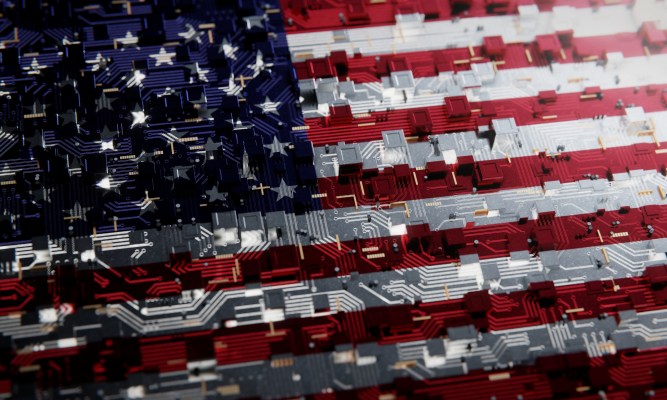After NFTs exploded over the past year, the U.S. Patent and Trademark Office and U.S. Copyright Office are launching a joint study to investigate the digital assets’ impact on intellectual property rights.
The study comes about a month after Vermont senator Patrick Leahy, a Democrat, and North Carolina senator Thom Tillis, a Republican, wrote to the offices asking them to look into NFTs given their exponential growth in a short period of time.
“Tillis has been out front looking to revise the [Digital Millennium Copyright Act] for quite some time,” Gordon Allott, president and CEO of regulatory tech for digital assets and virtual currency at BroadPeak Partners, told TechCrunch. “Everyone is reasonably familiar with the phrase ‘I got DMCA’d.’”
The letter from the senators piqued the interest of the agencies: “As requested, we write to confirm our receipt of your letter and to advise that we will indeed conduct the study,” the offices wrote. “The USPTO and the USCO have had preliminary discussions on next steps and on how to best consult with stakeholders about this topic.”
This is the first move to get NFTs on Congress’ agenda next term, Allott said. “Stakes on copyright infringement have gone up with NFTs. Someone can steal your copyright, sell it as an NFT and then vanish. You can DMCA until the cows come home but you’re not going to get your money.”
A handful of areas within the NFT subsector will be addressed, including potential IP challenges with future use cases of NFTs, the ability and rights behind transferring ownership of NFTs, licensing rights and infringement, as well as IP rights for NFT creators.
“IP for NFTs can help verify content and authenticity and help tackle counterfeit issues,” Aditi Oberoi Malhotra, founder of NFTartpedia, told TechCrunch, “such as identifying potential unauthorized reproductions or derivative works.”
The road unknown
It isn’t fully clear yet, but NFTs may be subject to IP protection, Malhotra said. “NFT buyers should pay close attention to what IP rights come with the NFT one is purchasing.”
For example, some NFTs offer rights to make derivatives and use them commercially, while some restrict it, and others can act as a pass to exclusive access, Malhotra noted.
“With respect to the broader IP implications of the NFT industry, I view NFTs as an innovative answer to the lack of innovation derived from traditional copyright holders,” Les Borsai, co-founder and chief strategy officer at Wave Financial, said to TechCrunch. “Web3 is about privacy, community, transparency and decentralization.”
Greater demand for regulatory framework
In general, there has been demand from both government officials and crypto entities for clarification, guidelines and regulatory frameworks as players aim to operate in a legal and safe environment. “Parameters around IP rights are still blurry, but lawsuits, studies and regulations will help bring more clarity to the NFT holders,” Malhotra said. “IP law will continue to get more refined. We are still in the early days.”
“By introducing digital scarcity to art and collectibles, NFTs and blockchain technology have granted further economic and creative powers to artists and collectors,” Poppy Simpson, senior content manager at Meural, told TechCrunch. The brand works with creators to explore new licensing opportunities beyond traditional channels.
“But there remains confusion around the rights that ‘ownership’ of an NFT confers. Addressing IP as an integral part of the NFT design process is a useful next step for the industry. And while the conclusions of this U.S. Patent and Trademark and Copyright offices’ study will surely be clarifying, there is also a need to innovate new standards and models that ensure an inclusive and fair future for digital art.”
This study has the potential to clarify IP rights surrounding the current and future use cases of NFTs, but not everyone is happy about the offices’ plan to conduct the study.
“Government is historically slow to understand, regulate and adopt innovative trends. Copyrights have been a broken system for years,” Borsai said. “Because ownership of intellectual property changes so often, the USPTO and Copyright offices have a complete inability to track ownership, and there is therefore no way they can regulate infringement.”
Both offices declined to comment on the matter and deferred to their response letter.
“Going after infringement has proved more profitable than innovating,” Borsai said. “I am not entirely clear what benefit the USPTO or copyright office brings to the table so far as the copyright implications of NFTs are concerned.”
Global efforts
There has been a push globally by regulators to create a legal framework for the whole crypto ecosystem, and every government and agency has had its own take on it. The European Central Bank released three reports on Monday calling for policymakers and members to pass a Markets in Crypto-Assets (MiCA) law to create a comprehensive framework for cryptocurrencies.
Meanwhile, on Tuesday, the U.S. Department of Treasury shared an open invitation for comments on President Joe Biden’s Executive Order 14067, which aims to regulate the crypto industry.
“For consumers, digital assets may present potential benefits, such as faster payments, as well as potential risks, including risks related to frauds and scams,” Under Secretary of the Treasury for Domestic Finance Nellie Liang said in a statement. “The Treasury Department is seeking to benefit from the expertise of the American people and market participants by soliciting public comment as we engage in this important work.”
The executive order was signed and outlined on March 9 with plans to regulate cryptocurrencies like bitcoin, Ethereum and stablecoins, while asking other government agencies to eye the industry and protect consumers.
